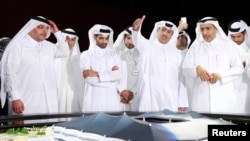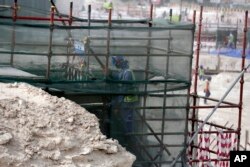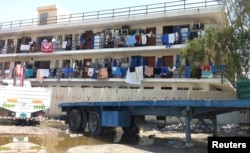As investigations into the FIFA soccer scandal deepen, Qatar may have much to lose: its host status for the 2022 World Cup.
In recent days, a FIFA official said that the oil-rich Gulf kingdom – as well as Russia, host to the 2018 Cup – could lose the right to stage games if investigations demonstrate that the two countries bought votes.
"If evidence should emerge that the awards to Qatar and Russia only came about thanks to bought votes, then the awards could be invalidated," said Domenico Scala, independent chairman of FIFA’s audit and compliance committee, in an interview published Sunday in the Swiss newspaper SonntagsZeitung.
U.S. Justice Department investigators, who announced their probe June 2, say they have uncovered evidence of bribery and corruption in the bidding process for the 2010 World Cup in South Africa and the 2011 FIFA presidential election. A separate Swiss investigation is looking into how hosting rights were awarded in 2010 to Russia and Qatar.
Both Qatar and Russia have denied any wrongdoing. Neither was named in the recent 47-count Justice Department indictment of FIFA officials on charges of "racketeering, wire fraud and money-laundering conspiracies" over the past 24 years.
Qatar says it won the bid on merit alone.
"We are confident we have entered the competition in accordance with the conditions set.… Unfortunately, some parties can’t see a Muslim Arab state succeed in attracting such championships," said Foreign Minister Khalid bin Mohamed Al Attiyah, according to The Peninsula, a Qatar English-language news organization.
But Britain’s Sunday Times released a report a year ago, “Plot to buy the World Cup,” saying it had proof that Qatar paid $5 million in bribes to secure the 2022 tournament.
Last November, FIFA ended its own investigation into irregularities in bidding, saying that any violations were very “limited” in scope.
On Monday, FIFA stood firm on keeping Russia and Qatar as hosts. It released a statement saying that, because the sites were chosen “by democratic vote of the Executive Committee … FIFA has no legal grounds” for stripping either of their games, CNN reported.
Analysts say FIFA is not likely to revisit the bidding process until it holds elections to replace the organization’s president, Sepp Blatter, who announced his resignation last Tuesday after his re-election days earlier to a fifth term. He’s expected to continue serving until his successor is chosen, probably sometime between December and March, Scala had said.
Concerns over Qatar venue
The Qatar bid was controversial from the start. The tiny desert state has no history of international football. With summer temperatures as high as 49 degrees Celsius or 120 degrees Fahrenheit, it is arguably too hot for players and spectators.
Because Qatar does not recognize the state of Israel, Jewish players worried they might be banned or that, if they were permitted to play, their flag and anthem would not be allowed, Jewish media reported.
And fans worried they would not have access to alcoholic beverages. Islamic law outlaws homosexuality, and it’s unclear what that would mean for gay visitors.
Human rights groups have long condemned Qatar’s treatment of migrant laborers from South Asia, who account for as much as 90 percent of the country’s population and are vulnerable to a host of employer abuses. The International Trade Union Confederation charged, in a March 2014 report, that at least 1,200 workers already had died while working on Qatar’s World Cup projects. But that number could not be independently verified.
Last week, Qatari’s government communications office said that “not a single worker’s life has been lost.” It already had promised last year to correct labor laws that allow a form of indentured servitude.
Qatar also addressed many of the other concerns: Initially, it said it could control the climate in its stadiums. Then it rescheduled the games for winter, clashing with American and European football seasons.
“All nations participating in the FIFA World Cup are welcome,” said Hassan Abdulla al Thawadi, chief executive of Qatar 2022’s Supreme Committee, promising Qatar would also allow alcohol consumption during the games.
As for the issue of homosexuality, Qatar’s sports minister told the Associated Press last November that, as with alcohol, he believes his country could find “creative” solutions to respect visiting gay football fans.
Possible economic losses
It isn’t clear how much of its estimated $200 billion budget Qatar has so far spent in preparing for the World Cup.
Qatar has planned to build eight new stadiums and renovate three in preparation for the World Cup games. This week, its 2022 planning committee said FIFA’s troubles would “not impact” its preparations, which it called “ahead of schedule,” the French news agency AFP reported.
Also included in the budget are a new city, Lusail, a new railroad and metro system, and an improved highway system, 140 new hotels, a new deep water seaport and airport.
The financial organization Bank of America Merrill Lynch estimated direct World Cup spending -- stadiums and hotels -- at $16 billion, which Qatar would lose with the bid. It also estimates that Qatar's GDP growth would slow down by at least 0.5 percent annually. And all this could spell substantial delays for a planned $100 billion pipeline project.
By May 2014, Qatar had already spent about $500 million on projects since winning the bid, as well as another $26 billion on transportation infrastructure, Qatar’s World Cup organizers verified for VOA.
“It’s tricky,” said Colin Foreman, a news editor at Middle East Economic Digest. “If you speak to people in Qatar about, for example, the metro, they will adamantly tell you that it’s nothing to do with the World Cup, that they are building a metro to make Doha a better city for the people of Qatar and incidentally help get people around during the games.
“So, do you say that everything that they have spent on the metro is being spent for the World Cup?” he asked. “Or would it be spent anyway?”
As for the stadiums, Foreman said there has been some movement, “but frankly not that much.”
Migrant worker safety
This construction spree would not be possible without the 1.5 million migrant workers who account for about 94 percent of Qatar’s population.
The largest group of these – about 400,000 – come from Nepal, and Doha has approved taking in 180,000 more ahead of the World Cup.
In late 2013, Britain’s Guardian newspaper reported that Nepali workers were dying at the rate of one a day – more than half of them from heart attacks, heart failure or accidents on the job in conditions that amount to modern-day slavery.
“But it’s not just about deaths,” said Mustafa Qadri, Gulf migrant rights researcher at Amnesty International.
“There's a bigger point here, too. Hundreds of thousands of workers face a range of abuses, from forced labor to exploitation and trafficking. Domestic workers aren't even recognized by Qatar's labor law yet are particularly vulnerable to abuse,” said Qadri, whose organization outlined labor abuses in a report issued in May.
Rights groups have documented widespread abuses of migrant workers, many of whom are forced to work long hours in grueling heat for salaries well beneath minimum wage.
“Amnesty International, the United Nations special rapporteur and an independent review commissioned by the Qatari authorities themselves have all called on Qatar to carry out a thorough, independent investigation into the leading causes of migrant worker deaths and identify key measures to address these,” Qadri said. “But as far as we are aware, that has not been adequately carried out yet.”
Qatar’s construction boom has attracted some of the biggest multinational companies in the world, Qadri said. He views the World Cup as an important vehicle for pressuring Qatar to improve its record on migrant labor rights.
“But unless Qatar urgently begins the process of fundamental reforms … the World Cup won't be celebrated for the football but remembered as a tournament built on the back of migrant labor abuse,” he said.
Qadri also worries that if the games are pulled from Qatar, it could remove the impetus for Qatar to improve the treatment of migrants.
It could also have an impact on South Asian economies, he said.
World Bank data show a steady increase in remittances from Qatar to Nepal since it won the 2022 tournament: In 2010, guest workers in Qatar sent $1.36 million home to Nepal. By 2014, that number had risen $1.68 million.
These remittances account for about a quarter of Nepal’s gross domestic product. The government estimates that if these remittances stopped, poverty would jump from around 19 percent to more than 35 percent.
Psycho-social impact
This would not just be Qatar’s first World Cup but the first in the Middle East, said MEED’s Foreman.
“There are an awful lot of people in the Middle East and they are very keen, passionate, about football,” he said. “There’s a feeling in the region that they deserve to have a World Cup, and Qatar is the country that can do it.”
Having the games taken away would send a powerful message to the region, analysts said.
“Qatar would be devastated,” said Simon Henderson, a fellow at The Washington Institute for Near East Policy. “And if Qatar is upset about it, some of the blame that Qatar will distribute in response to its being upset will be directed at the United States, who it regards as being a competitor for the slot in the first place – and the instigator of the criminal charges which have been made against FIFA officials.”
But other analysts see little reason for concern.
“The U.S. and Qatar are allies in very practical and substantive ways,” said Charles Untermeyer, who served as U.S. ambassador to Qatar for three years under President George W. Bush.
“No. 1, U.S. energy companies such as ExxonMobil, ConocoPhillips and also some subsidiary firms have very strong contacts with Qatar,” Untermeyer said. “Second is the fact that there are six U.S. universities in Doha in Education City; and the third is the presence of a very important military base, Al Udaid, which is a Qatari base but used by the United States since the mid-1990s.”
But Washington and Doha have not always seen eye to eye.
Sticking points have included Qatar’s political and humanitarian support of Hamas and tacit support of Islamist groups, including the Nusra Front in Syria and the Muslim Brotherhood.
“But I do not believe at this juncture that Qatar will lose the World Cup,” Untermeyer said.
That said, he expressed confidence that Qatar's economy is strong enough and its infrastructure needs great enough to any absorb any “change in plans.”







